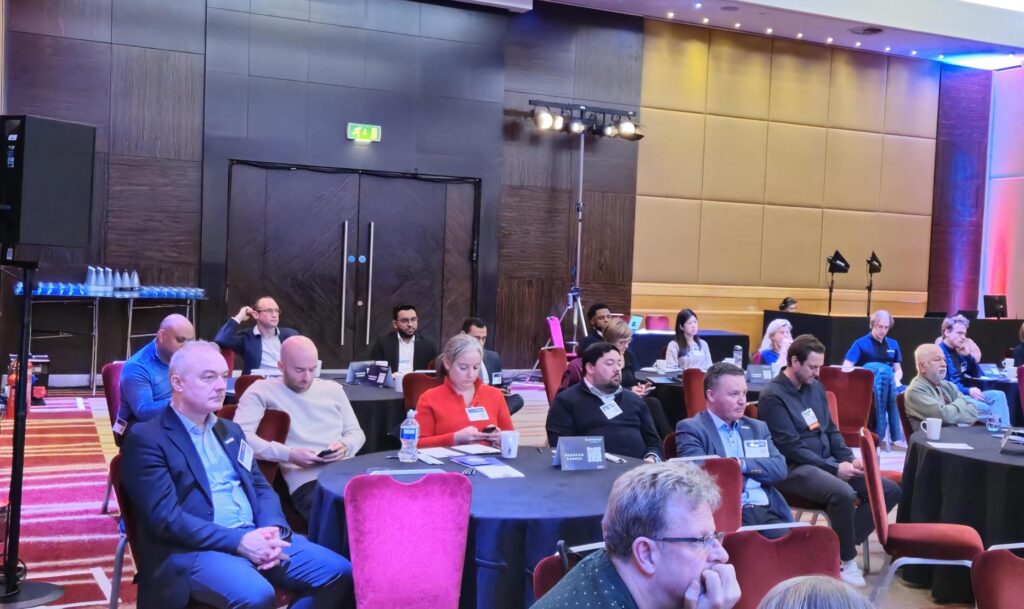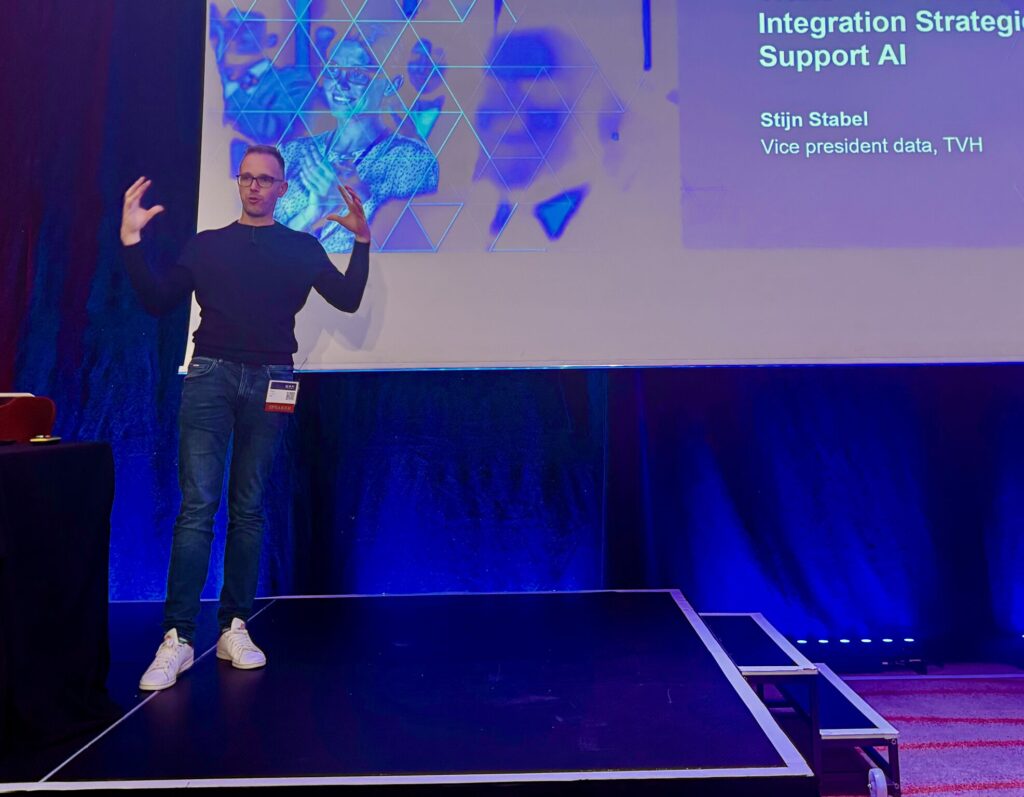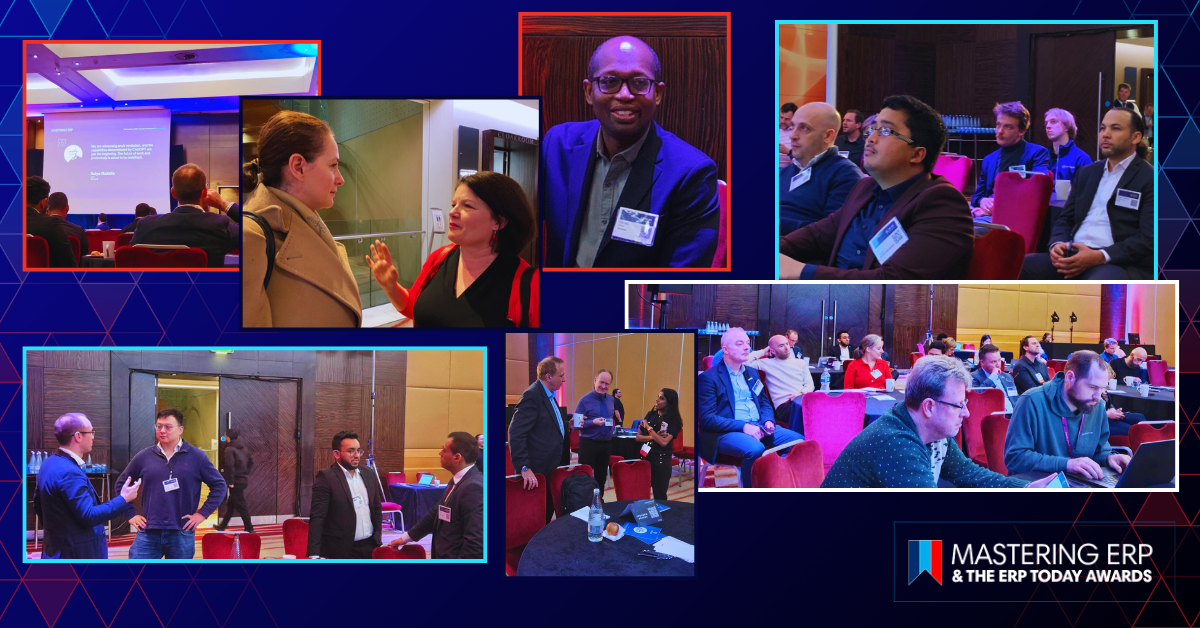Successful AI integration into ERP systems requires foundational knowledge and preparation, including understanding key AI concepts, emerging trends, and the importance of maintaining a clean ERP core to fully harness AI’s potential.
The inaugural Mastering ERP conference on December 12 saw ERP and AI professionals join with top experts at the Park Plaza London Riverbank hotel, collaborating together on best practices for innovating core ERP applications using artificial intelligence.
As a companion event to the ERP Today Awards 2024 celebration, this learning and discussion-based summit delivered the critical information and key connections ERP Insiders need to plan and execute their AI in ERP projects next year and beyond. ERP Today CEO Mark Vigoroso was both host and a keynote speaker, introducing recent Wellesley Information Services research suggesting that while AI adoption is progressing, organizations are cautious toward its application in core operational areas, emphasizing the need for continued development and validation of AI technologies to meet these specialized demands.
The research report showed 27% of organizations are currently using or have used AI for customer service, but outside of this function, AI adoption is extremely low for other business functions. The data suggests that a significant number of organizations are still in the evaluation phase for integrating AI into core business functions.
Outside of the research, Mark dropped a great tidbit from one academic who reports that if AI development stopped at this moment, it would take 5-10 years to fully absorb the impact of models and everything else developed so far as has already happened for every industry in the world today.
Other keynote highlights included Maria Axente, head of AI public policy and ethics, PwC UK, who discussed the critical role of technical expertise when it comes to “engineering” trust in AI. Axente brought up the fable of Icarus with our wings as dreams, on the precipice of unfurling through the potential of AI. But like Icarus, ERP Insiders must beware the solar heat of bias damaging both trust and ethical safeguards.
The PwC leader also highlighted a fundamental question from engineers: Who are we to decide when it comes to Ethical AI? In other words, architects on the back end shouldn’t be relied upon to define and mitigate biases in AI – organizations must instead define this, especially as engineers can inadvertently bring their own biases to the table, such is human nature.
Ultimately, effective AI deployment requires transparency, fairness, and security. Strong governance frameworks and proactive risk management are essential to mitigate security exposures and ensure compliance with regulations, enabling businesses to deploy AI responsibly and securely.
Mark Wheeler, chief product & IP officer, NTT DATA Business Solutions, meanwhile gave a funny, sparkling talk that avoided the hype and discussed AI in practical terms. Attendees knew they were in for a treat when he asked what song he should have used as an intro for his keynote; Livin’ On A Prayer and Drop It Like It’s Hot were some of the suggestions reflecting the AI hopes and dreams of ERP Insiders.
In his talk, Wheeler conceded AI is only delivering marginal gains at the moment, but that we are still on track when it comes to the exponential curve of AI development. He also dives into the critical KPIs Insiders need to establish and the investments they need to make in people, processes, and platforms to realize the benefits of improved decision-making, reduced costs, and streamlined operations. Attendees discovered how to deliver a competitive edge by strategically aligning AI investments with their organizational goals, and the crucial steps and strategies they need to leverage when building a compelling business case for AI integration.

A panel discussion on AI ethics, governance, and security in business systems saw Axente return with our friend Abigail Allman, host of the Women in ERP podcast, ERP Solutions Leader, Resulting IT and UN Women UK Delegate – talk about a triple threat! Abigail chaired the debate with her guests Maria, Emma Chambers, head of Apps & Platforms, Calor, and Richard Hunt, CEO and founder, Turnkey. A lively debate and discussion on the critical issues of Responsible AI, Governance, and Security ensued. Examined was how the three intertwine to deliver AI capabilities that are unbiased, compliant, and secure. Delegates discovered why transparency, fairness, and accountability are key to responsible AI deployment and how data, algorithms, design, and training contribute to proper governance. The panel also navigated the multitude of critical security exposures that AI can introduce and the key guardrails Insiders need to put in place.
Nadja Andersen VP, Solution Strategy & Innovation, Kelly Services reminded ERP Insiders that before they can embark on the journey to enable AI in their ERP landscape, it’s critical to understand the road ahead. Andersen dove into key AI concepts, emerging trends, and essential terms ERP Insiders need to know for a successful adoption into their organization – in other words, how to set the stage so they’re prepared before going too far down the automation road.
Stijn Stabel, vice president of Data for TVH, examined strategies for modernizing ERP landscapes to prepare for AI integration, ensuring enhanced efficiency, data utilization, and decision-making capabilities. Shanthi Nachiappan, director, Statsdatamining Limited, meanwhile gave a deep insight into Retrieval-Augmented Generation (RAG), drawing from her extensive experience at BT Group.

Building effective data foundations that are resilient, scalable, and AI-ready was the focus from Philip White, managing director, Audacia. In his talk – which gave the metaphor of building a Caterham vehicle – AI was presented as fundamentally contingent upon the robustness of an organization’s data foundations. White thus explored the essential strategies for building effective data foundations that are not only AI-ready but also resilient and scalable. Following White was Pete McDermott, founder & enterprise systems architect, Lunacon, who spoke about IFS and AI in relation to clean core. The advent of AI, he argued, necessitates a streamlined and efficient ERP system to fully harness AI’s potential. His session discussed the importance of achieving a clean ERP core and minimizing customizations as a preparatory step for AI integration, highlighting the benefits of standardization, improved data quality, and enhanced system performance.
Wrapping up the day was a panel hosted by Mark Vigoroso with Stijn Stabel, Nadja Andersen and Emma Chambers. The experts shared the impact of AI on the workforce and IT departments, and what this new reality means for Insiders and their businesses.Brought up were novel concepts such as gamification in recruitment and “Co-coding”, where dev experts work alongside citizen developers. Salesforce was also mentioned as an AI ‘winner’ out of the various software players – but the biggest takeaway was that in ERP, the vendor who keeps customers’ cores cleanest will lead the way.
As a whole, Mastering ERP provided valuable insights into the successful adoption of AI in organizations, focusing on the foundational steps required for integration. A key takeaway was the importance of understanding AI’s core concepts and how it fits within the broader business landscape. Before diving into AI, organizations must grasp essential terms, trends, and the critical context of AI to ensure successful implementation.
The role of technical expertise in building trust in AI systems was also emphasized. Experts are essential in making AI solutions reliable, transparent, and ethical. Their involvement in testing and ensuring AI systems meet ethical standards is crucial for fostering trust among stakeholders and ensuring long-term success.










